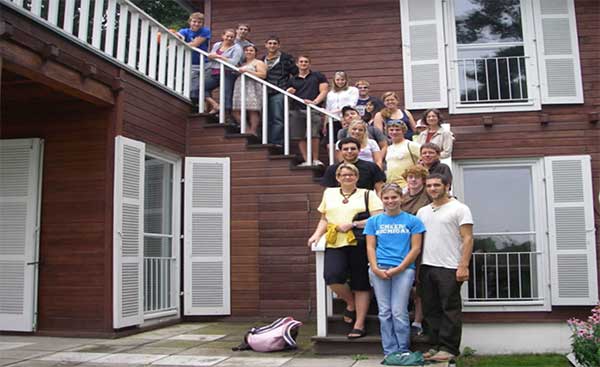Gaining Inspiration from Galileo, Einstein and Oppenheimer
by Catherine Westfall

GAINING INSPIRATION: Summer Abroad participants at Albert Einstein’s summer house in Caputh, 2008. Catherine Westfall is in the yellow shirt up front to the left, Gerd Kortemeyer is in a brown shirt about third row on the right.
This stimulating, well-attended session started with a talk by Galileo scholar Paolo Palmieri from the University of Pittsburgh. From him we learned how Galileo inspired a wholly new way to investigate nature. Before Galileo, inquiries into the natural world were neither experimental nor quantitative.
Galileo changed that. He insisted that investigations should be experimental and that reasoning should be guided by mathematics. In the process he showed that a new sort of mathematical physics could be built upon principles arising from experiment, which allowed insights to blossom from uncertain foundations.
The second speaker was physicist Gerd Kortemeyer from Michigan State University who described a course he and I co-taught that took Michigan State undergraduates to Munich, Bern, Berlin, Zurich, Copenhagen, and Göttingen to “walk in the footsteps of Einstein” and learn about the development of quantum mechanics and relativity.
In addition to showing pictures of happy students touring, discussing, hiking, and role playing in gorgeous European locales, Kortemeyer explained how historians and physicists can work collaboratively and productively to teach students to the great advantage to both disciplines. The key strategy is to take every opportunity to engage students in their own learning – through individual study plans, group work, creative exercises, and shrewd use of scenery while constantly providing interdisciplinary information, perspectives and challenges. The final speaker was physicist Cameron Reed from Alma College who explained how the appreciation and teaching of physics can be enriched by historical exploration. Reed employed a number of anecdotes, some tragic, some inspiring, spanning in time from Kepler to the wartime development of the atomic bomb. Reed convincingly concluded that even great physicists are subject to the usual whims of human nature and the sometimes cruel circumstances of their times. Many students attended this session and every talk inspired thoughtful questions and comments.
The articles in this issue represent the views of their authors and are not necessarily those of the Forum or APS.
